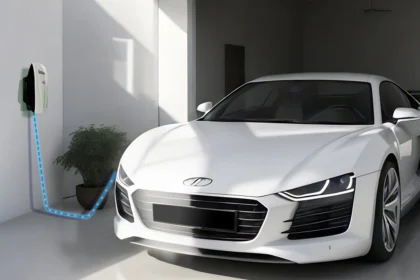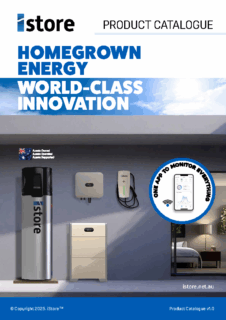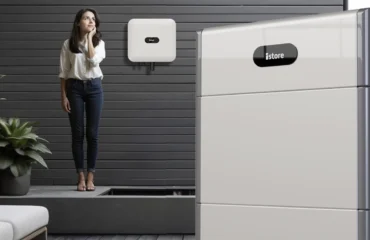
EV sales are surging year after year, with more Aussies going electric than ever before. Are you one of them? Whether you drive an electric vehicle for the savings, the sustainability, or the tech appeal, one thing’s for sure: charging matters.
From powering up at home to installing charging stations at your business, knowing your charging options can save you time, money, and a whole lot of hassle.
What is an EV charger, and what do you need to know about it? We’ll cover the different types available, how they work, and how fast they charge so you can choose the best setup.
What Is an EV Charger?
An EV charger is a device that transfers electricity into an electric vehicle’s battery, allowing it to recharge and power the car’s motor.
How Does an EV Charger Work? EV Charging Basics
- The charger draws electricity from your home or business’ electricity source, be it the grid or solar panels.
- Most homes and businesses supply AC (alternating current), which needs to be converted to DC (direct current) because EV batteries only use DC power. An inverter steps in to do the job, either inside the charger (for DC fast chargers) or inside the car using its onboard inverter.
- The converted electricity is then sent through the charger and into your EV’s battery.
Types of EV Chargers
Level 1 Chargers
Level 1 chargers are the most basic type and come standard with most electric vehicles. They plug into a regular 240-volt (V) household power outlet, so there’s no special installation needed.
They’re the slowest charging option, but provide enough for overnight charging if you drive short distances.
Level 1 chargers can be a practical option for plug-in hybrid vehicles. Since hybrids have smaller batteries than full EVs, they don’t take as long to recharge, making a standard outlet more than capable of topping them up.
Level 2 Chargers
Level 2 chargers are faster and more powerful than Level 1 chargers. They require a dedicated 230–240V circuit, similar to what large appliances like ovens or air conditioners use, and usually need to be installed by a professional.
These chargers are compatible with most EVs and plug-in hybrids and are ideal for daily home use or for businesses looking to offer EV charging to staff or customers.
EV charging standards in Australia are shifting toward smart chargers as the new normal. Many Level 2 chargers can monitor energy usage, allow you to schedule charging during off-peak times when electricity is cheaper, and even integrate with solar systems to maximise efficiency. All this helps you lower costs, reduce grid reliance, and keep your EV ready when you need it.
Fast Chargers (DCFC)
DC fast chargers (DCFC) are the quickest way to charge an EV. Unlike Level 1 and Level 2 chargers, which supply AC power, DC fast chargers deliver electricity in DC form directly to the battery, skipping the vehicle’s onboard inverter.
They require a high-voltage, three-phase power supply and are installed in commercial or public locations like shopping centres, service stations, or highway rest stops. They service commercial vehicles making long trips or fleet vehicles needing quick turnarounds.
Understanding EV Charging Speeds
EV charging speed is measured in kilowatts (kW), which refers to how quickly electricity is transferred to your vehicle’s battery.
Charging speed depends on two main factors: an EV’s maximum charging capacity and the size of its battery.
Every EV has a built-in limit on how much power it can accept at once. So even if you plug into a high-powered charger, your car will only draw what it’s designed to handle.
For example, if your EV has a 7 kW onboard charger, it won’t charge any faster than 7 kW, even if you’re using a 22 kW charger. On the flip side, if your EV can accept 11 kW but you’re using a 7 kW charger, it will charge at the lower 7 kW speed.
EV batteries are measured in kilowatt-hours (kWh), which indicates how much energy they can store. A larger battery takes longer to fully charge than a smaller one.
Charging time is a mix of how fast power flows (kW) and how much energy your battery can hold (kWh). Matching your charger to your vehicle’s capabilities helps you get the best results.
Comparing EV Charging Speeds
| Charger Type | Power Output | Typical Range Added | Typical Charging Time | Power Source | Best For |
| Level 1 | Approx. 2.4 kW | 10–20 km per hour | 14–24+ hours (full charge) | Standard 240V outlet | Plug-in hybrids, light daily EV use. Slowest option; ideal for overnight top-ups |
| Level 2 | 7–22 kW | 30–130 km per hour | 4–10 hours (full charge) | Dedicated 240V circuit | Daily home charging, businesses with EV bays. Faster, more efficient charging, often with smart features |
| DC Fast Charger (DCFC) | 50–350+ kW | 150–300+ km in 15–30 mins | 20–60 mins (up to 80% charge) | High-voltage 3-phase power | Highway stops, fleets, fast turnaround needs. Not suitable for most homes |
Benefits of Installing an EV Charger at Your Home or Business
- Convenience: Charge your EV anytime without needing to visit public charging stations or wait in queues.
- Cost Savings: Charging at home or work, especially during off-peak hours, can be cheaper than using public chargers or buying fuel.
- Energy Efficiency: Pairing with solar panels or smart charging helps you use cleaner, lower-cost energy while avoiding unnecessary power use. Smart chargers can monitor energy use, schedule charging during cheaper off-peak times, and manage how power is delivered if you have more than one EV or a variable electricity plan.
- Increase in Home Value: A dedicated EV charger can make your property more appealing to future buyers or tenants.
- Attracting Customers or Tenants: For businesses and rentals, offering EV charging can help draw in eco-conscious drivers.
- Tax and Incentive Opportunities: Depending on your location, rebates or tax incentives may be available to offset installation costs.
Why Choose iStore for Your EV Charging Solutions?
For EV charging at your home or business, you want a setup that’s simple, reliable, and cost-effective. As an Australian-owned, family-run company, we truly understand what you need.
Our EV chargers work with your lifestyle, not the other way around. They give you fast, efficient charging with the option to connect to hybrid solar inverters and solar batteries for even bigger electricity savings and an even smaller impact on the environment.
With iStore, you’ll enjoy local support, expert advice, and quality products that go the distance. Charge with confidence, knowing you’re getting a smarter, more convenient way to power your EV.
We supply two EV charger models to suit different charging needs.
- 7.4kW 230V AC 1-Phase EV Charger: This model offers overnight charging using a standard single-phase power supply. It’s ideal for everyday EV use and suits typical Australian household energy setups.
- 22kW 400V AC 3-Phase EV Charger: Designed for larger homes or businesses with a 3-phase power supply, this model delivers much faster charging to larger EVs, multiple vehicles, or commercial vehicles.
FAQs
What Does an EV Charger Do?
An EV charger supplies electricity to an electric vehicle’s battery, allowing it to recharge. It connects to a power source and controls how quickly and safely energy is delivered to the car.
Can I Have an EV Charger at Home?
Most homes can support an EV charger. Level 1 chargers plug into a standard outlet, while Level 2 chargers may need a licensed electrician to install a dedicated circuit.
What Are the Different Types of EV Chargers?
There are three main types of EV charger: Level 1 (slow, plugs into a standard outlet), Level 2 (faster, requires a dedicated circuit), and DC fast chargers (very fast, typically for commercial use).
How Much Does It Cost to Install an EV Charger in Australia?
Most EVs come with a free Level 1 charger. For faster charging, you’ll need a dedicated Level 2 charger.
Level 2 EV chargers can cost between $500 and $2,000. Including labour and materials, installation can cost $700 to $1,300. So overall, you could pay $1,200–$3,300.
Installing a DC fast charger (DCFC) at a business can cost between $50,000 and $160,000+. This price includes around $40,000 to $100,000 for the charger itself and $10,000 to $60,000+ for installation, electrical upgrades, and site preparation.
Power Your EV with Smart Charging Solutions from iStore
If you were wondering, “What is an EV charger?”, we’re sure you’re not anymore!
But if you have questions about how to choose the right EV charger for your home or business, we’re more than happy to help.
Browse our range of the best home EV chargers in Australia today, then get in touch by calling 1300 515 640 or filling out this online form.
Convenient and efficient EV charging awaits!



